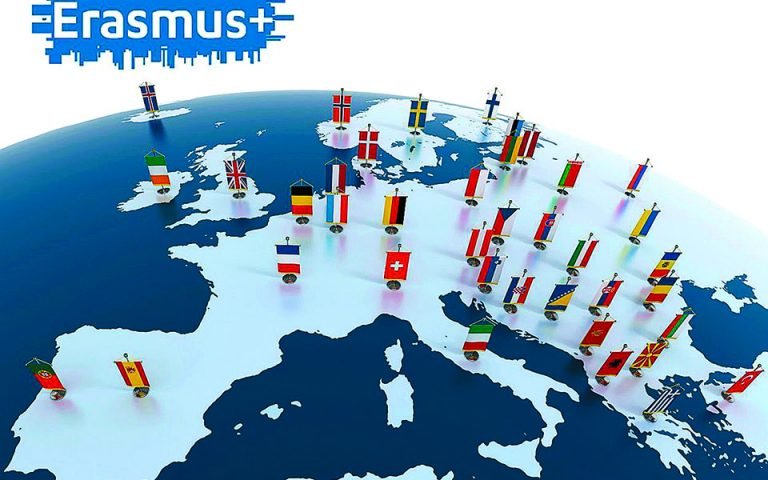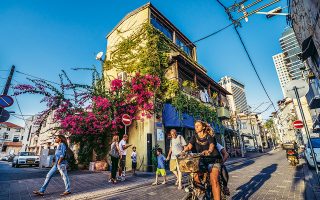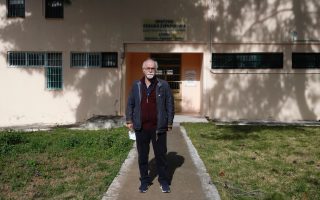Erasmus: The heart of European educational openness

Greece’s 40-year journey inside the European Union records countless tangible benefits – from bridges and roadways, to funded programs and historic legislative developments. But there are also less visible long-lasting changes – acquis that transformed lifestyle, although often taken for granted – such as freedom of movement, mobility and interaction of member states’ populations. At the heart of it all is perhaps European Union’s most iconic program: the extremely popular Erasmus.
Erasmus, today known as EU’s largest program for the support of a range of initiatives in education, learning, youth and sport with a budget of over €14 billion euros, started relatively modestly, in the early 80’s, with some pilot student exchanges. Its name is a tribute to Dutch philosopher Erasmus, the famous “opponent of dogmatism,” who lived and worked in several parts of Europe in quest of experiences, placing from the beginning the concept of cultural diversity at the heart of the project.
Despite its modest beginnings, Erasmus’ progression has been considerable. In 1987 only 3,244 students participated in the exchange program – among them 37 Greek students who decided to attend a semester abroad. By 2006, more than 150,000 students each year were gaining experience in other European members states. In its first 20 years, more than a total of two million European students benefited from Erasmus scholarships.
Today, for a generation which grew up with it, Erasmus is almost synonymous with the European Union. In the last six years, the expanded Erasmus + has provided more than 4 million people with the opportunity to get educational or professional experience abroad. Among them, 2 million students and 650,000 vocational students, but also more than 800,000 lecturers and professors and half a million young people participating in funded volunteerism or exchange programs. The last decade also gave us one of the cutest statistical findings when, in 2014, Commissioner Androulla Vassiliou cheerfully announced that the program led to the birth of 1 million “Erasmus” babies.
In addition to the multiple benefits that mobility provides on a personal level, Erasmus has given a deeper collective value: the importance of multiculturalism, of openness and of exchanging different perspectives within the academic context, for the benefit of all. “Research cannot be conducted in a single country. In my opinion, from the regulatory legislative framework point of view, it would be a terrible loss not to have access to the perspective of a country with different culture, laws, thoughts about ethics and efficiency”, says Vivian Stergiou, a 28-year-old writer and lawyer who completed her postgraduate studies in the Netherlands and is currently pursuing part of her PhD in collaboration with a German university. “I held, for example, a seminar on European Law where the level of discussion that unfolded would literally not be possible in a homogeneous environment or in a legal discussion where we would have all read the same books, and in which there would have been no multicultural empirical and experiential part ” she adds.
In the collective consciousness the word Erasmus is inextricably linked to student exchange programs. Although the budget’s majority actually targets people’s mobility, a significant 28% aspire to promote transnational cooperation between educational institutions for the innovation and exchange of best practices. From 2014, approximately 125,000 educational institutions, youth organizations and businesses have participated in Erasmus + collaborative programs, applying innovative practices and learning from shared and diverse experiences.
One of the emblematic collaborations was the project “Gamify your teaching” implemented by a consortium of 7 European countries, including Greece. The initiative identified the gap that often separates education from technological reality, and helped 25,000 professors and entrepreneurship educators upgrade their teaching skills through technology and modern video games, with the aim of strengthening entrepreneurship and developing teaching skills through “gamifying”.
Dozens of corresponding case studies and best practices can be found on the Open Education Europa portal, created by the European Commission to capture innovative ideas in educational environments and to ensure that anyone across the EU can identify, discuss and learn about new and innovative teaching methods. “During the pandemic, when we suddenly had to adapt to the difficult digital transition, I really found the most valuable material at Open Education Europa on the use of digital teaching tools,” says Katerina Dimou, a 36-year-old primary school teacher.
After 35 years of operation, and despite the difficulties brought by the pandemic, the Erasmus + program is looking forward to an even more promising future. After all, shortly before the end of 2020, the document agreed between the European Parliament and the Council of Europe on EU’s long-term budget for 2021-2027, supports 10 selected EU programs over the next seven years, with the aim of providing opportunities to the next generation and of preserving European values in the post-pandemic reality. Among them, Erasmus +, for which an increase in funding of € 2.2 billion has been secured – the equivalent of one extra year of operation.
In Greece’s 40-year journey inside the European family there is a continuous evolution – both for the country and the Union itself – however one of the main priorities of the project remains constant: building a common European identity, based on common values and ideals. In this field, Erasmus seems to be forging – perhaps – the strongest sense of “belonging” in the European Union. Recent Eurobarometer findings show that 80% of young Europeans identify themselves as European citizens – a clearly higher percentage than in the past – while Erasmus + participants show a satisfaction rate of over 90%.
“For me, the opportunity to travel to Europe with other people, united by the same love for exploration, was definitely the most important element of Erasmus” says 27-year-old lawyer Giannis Stathakis, who remembers fondly his experience in Albi, France. “Sitting on a university desk of another member state is a wonderful experience in itself. But crossing one border after another, learning the tastes and habits of your neighbors, only with a Greek identity card and the same-crumpled- banknotes in my pocket, is what made me really feel like an EU citizen. ”





